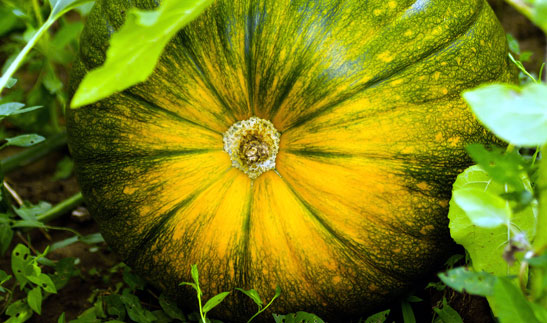
When To Stop
It was separation that led to completion;
from completion ensued dissolution.
But all things,
without regard
to their completion and dissolution,
may again be comprehended in their unity;
It is only the far reaching in thought
who know how to comprehend them in this unity.
This being so, let us give up our devotion to our own views,
and occupy ourselves with the ordinary views.
These ordinary views are grounded on the use of things.
(The study of that) use
leads to the comprehensive judgment,
and that judgment secures the success (of the inquiry).
That success gained,
we are near (to the object of our search),
and there we stop.
When we stop,
and yet we do not know how it is so,
we have what is called the Tâo.
Zhuangzi by Zhang Zhou, trans. by James Legge, The Adjustment of Controversies
Three pumpkins. In the backyard, three good-sized pumpkins are still on the vine. I do not know what conveyed a seed into the tomato bed, leaving it there to germinate. The vine was impressive as it grew, luxuriant, with saucer size blossoms. I didn’t remove the plant because I thought it visually remarkable.
At first there was one pumpkin, which we learned to protect with improvised chicken wire. Squirrels have a taste for young pumpkin. What is a pumpkin? A berry, a vegetable, or a fruit? Now we have three, two of which are mature, a bright orange, and the third and largest, has yet to turn a ripe shade of orange. The outcome, the completion/dissolution of this serendipitous plant, will be three jack-o-lanterns conveying delight, a lasting memory for three grandchildren.
There I will stop. Enough to say. Enough to know. The arc-of-nature in pumpkin mode. Soil, sunlight, rain and the laughter of children…